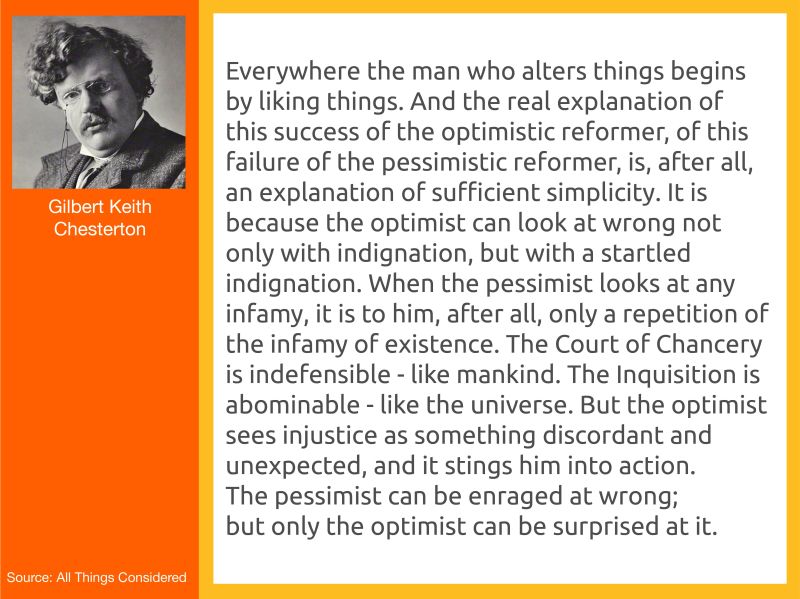30th August 2012 | By Simon Duffy
"the optimist sees injustice as something discordant and unexpected, and it stings him into action. The pessimist can be enraged at wrong; but only the optimist can be surprised at it"

Everywhere the man who alters things begins by liking things. And the real explanation of this success of the optimistic reformer, of this failure of the pessimistic reformer, is, after all, an explanation of sufficient simplicity. It is because the optimist can look at wrong not only with indignation, but with a startled indignation. When the pessimist looks at any infamy, it is to him, after all, only a repetition of the infamy of existence. The Court of Chancery is indefensible - like mankind. The Inquisition is abominable - like the universe. But the optimist sees injustice as something discordant and unexpected, and it stings him into action. The pessimist can be enraged at wrong; but only the optimist can be surprised at it.
G K Chesterton from All Things Considered
I love this thought from the ever insightful Chesterton and it rings a real bell.
I often meet people who agree that the current system is unfair: it's unfair that disabled people don't have effective rights to self-directed support; it's unfair that only the rich can influence their child's education; it's unfair that the poorest pay the highest taxes; it's unfair that too many people are placed in institutional and damaging settings if they are too old, unwell, angry or confused.
We spend nearly half of our GDP on welfare - handing this money over to Whitehall - and in return we get a system which satisfies almost nobody and which is designed in flagrant contradiction to the Declaration of Human Rights. We expect it to deliver safety and support for those with the greatest need, but instead we see it harming those in greatest need.
Yet very few people seem to feel that anything can be done about this injustice - it feels inevitable - part of the inherent wrongness of reality - as Chesterton puts it "the infamy of existence".
But what strikes me at least is how absurd the current system is. Its not just wrong, it's crazy:
This does not mean we don't need a welfare system (even a bad system is better than no system). But we should start to confidently define the features of decent and fair system. And, as Chesterton also observes, this will be one that values all those things that are good: citizenship, family, community, expertise and justice. The challenge is to build a system that respects and supports all those good things - rather than undermining them.